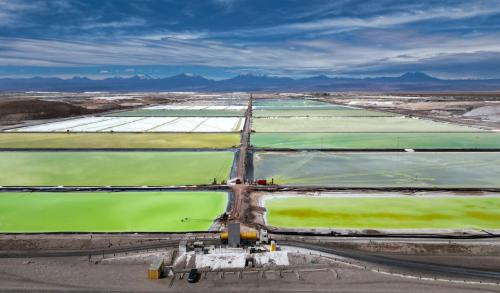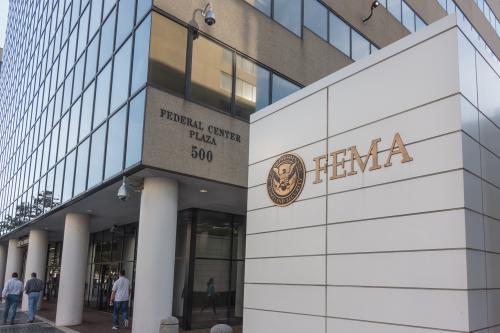Ahead of COP21, the climate change conference in Paris in December, President Obama officially submitted the U.S. climate action plan to the United Nations
committing to a 26-28 percent cut in greenhouse gas emissions by 2025.
Brookings experts Tim Boersma, Timmons Roberts and Philip Wallach weigh in.
 Tim Boersma: Washington 2016 vs. Paris 2015
Tim Boersma: Washington 2016 vs. Paris 2015
The blueprint for cutting United States greenhouse gas emissions by 26-28 percent by 2025 underlines the commitment of this President to address what he and the U.S. security and defense community view as one of the major threats to U.S. security going forward, namely climate change. Having said that, I think we have to be careful not to oversell the importance of what happens in Paris. It is worth considering that Secretary Kerry and others have been carefully making sure that a Paris deal does not legally qualify as a treaty, in order to avoid having it go through Congress.
Considering this political gridlock in Washington, arguably it is more important to look at Washington 2016 than at Paris 2015. If the Republicans take the presidency I think it is safe to say that this would not bode well for U.S. efforts going forward to install significant policies on this front. And if the Democrats deliver the new President, she (or he) will face political challenges comparable to the current President. Travelling around the Middle East and Asia leaves me with little reason for optimism that major emitters in these parts of the world will implement ambitious policies related to climate change, if the U.S. does not make significant commitments.
 Timmons Roberts: A very good first step
Timmons Roberts: A very good first step
While the U.S. pledge to reduce our emissions by 26-28 percent by 2025 is not surprising at all—given the November joint announcement with China of exactly the same numbers—this announcement is still important. First of all, it has a decent amount of ambition, bending the curve of U.S. emissions more quickly, pledging to speed the process of delinking carbon emissions from our economic growth. Is it enough to keep our planet at a safe level of warming? Not at all. Is it based on a just allocation of the remaining “atmospheric space” considering our vast responsibility for the stuff that’s up there creating this problem now and for years to come? Absolutely not. But it represents the first in a series of what are expected to be ever improving 5-year commitments to decarbonize the global economy. If that is the case, the U.S. pledge is a very good first step given the very difficult political world in which we live.
Second, that five and ten years from now we’ll be ratcheting down emissions across the 196 countries of the world is the current plan hoped for from the December Paris negotiations. Therefore, if movement this year gets us to break through initial barriers—such as pledges from both the global North and South to bend the carbon curve from increasing emissions to reductions—then this represents genuine leadership.
Third, this leadership is coming from the country that for years ducked any kinds of commitments. Recall that in Kyoto in 1997 the U.S. was slated for a 6 percent reduction 15 years down the line (by 2012), and that treaty was never brought to the Senate because it threatened not to ratify it. For the 15 years the U.S. did nothing, our inaction gave excuses to other laggards to do little or nothing about climate change. That has changed. This new pledge is for 16-18 percent reductions from our current emissions in the next 10 years, at arguably a more difficult political moment.
Finally, this INDC is an official submission to the United Nations, not merely an ad hoc bilateral announcement with China. Sure, the U.N. doesn’t have jack-booted storm troopers to come kick our butts if we don’t meet our goals, but it is a promise in a community of our peers, a group which we are less and less able to ignore. Those countries rightfully want to know if Obama’s efforts will endure the slings and arrows from the Republican-controlled Congress and a possible change of administrations. My observation based on previous pollution control legislation is that the Obama administration’s actions will survive. They are based on fulfilling Congress’ long-standing mandates to protect the public health against pollution through the Clean Air Act and other long-in-force and thoroughly justified laws. Since this pledge is built sector-by-sector on what the administration believes can be achieved using existing legislation and authority, it will be very difficult to stop its impacts. Gridlock cuts both ways—it protects existing authority and this emerging status quo. To make an enduring legacy of this important pledge, the administration is attempting to make all the pieces upon which this pledge is built “business as usual.”
 Philip Wallach: Achieving political sustainability for climate policies is the hardest part
Philip Wallach: Achieving political sustainability for climate policies is the hardest part
Back when President Obama announced his climate plan in his State of the Union address, I noted that the plan was premised on a willingness to “resolutely ignore all the legal and political stumbling blocks that might cause problems.” That continues to be the case: the administration assumes that America’s executive branch can soldier onward to achieve significant reductions in greenhouse gases without ever getting an assist from Congress, and without dwelling much on the possibility that Congress or the courts—let alone a Republican administration—would derail things.
That attitude may well be understandable for a second term President determined to forge a lasting climate legacy in upcoming international negotiations, but it is nevertheless an extremely risky one on which to base U.S. climate policy meant to endure for the long-term. Even as some on the right make a convincing case for the adoption of a carbon tax, Republicans look remarkably united and determined in their opposition to the Clean Power Plan, which remains the centerpiece of administration policy. At some point, U.S. government officials will have to acknowledge that achieving political sustainability for climate policies is the hardest part. But that moment certainly won’t come before the Paris talks, and probably not during the Obama administration.



Commentary
President Obama unveils U.S. climate action plan: Brookings experts weigh in
April 1, 2015